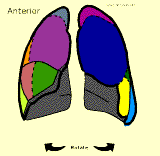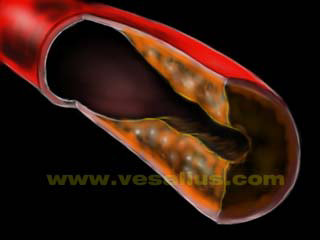 Sjogren's Syndrome
Sjogren's Syndrome|
|
![]() What is it?
What is it?
Sjogren's Syndrome is a term used to describe death of glands (salivary, and tear). It can occur when some of your body's infection-fighting cells (white blood cells), which normally protect you from infection, instead, attack your good glands.
![]() What can it do to you?
What can it do to you?
 It decreases
saliva, which makes your mouth dry. It can make it hard to swallow food, and to talk for an extended period of time. Having decreased saliva can also increase your chance of getting plaque accumulation and cavity formation.
It decreases
saliva, which makes your mouth dry. It can make it hard to swallow food, and to talk for an extended period of time. Having decreased saliva can also increase your chance of getting plaque accumulation and cavity formation.
 It decreases your tears. This makes your eyes dry, and itchy. Some people say that their eyes burn or that they feel like they have sand in their eyes. It also can increase your sensitivity to sunlight or bright lights.
It decreases your tears. This makes your eyes dry, and itchy. Some people say that their eyes burn or that they feel like they have sand in their eyes. It also can increase your sensitivity to sunlight or bright lights.
 The majority of people with Sjogren's Syndrome will feel tired a lot of the time.
The majority of people with Sjogren's Syndrome will feel tired a lot of the time.
30% of people can have problems to other parts of the body, that are discussed below. This happens when the white blood cells, that normally protect your body from infection, instead attack good parts of the body.
 The two bean shaped organs in the picture to the left are located around your stomach and are called kidneys. Their function is similar to a water filter. They filter impurities out of your blood. Sjogren's Syndrome can cause the kidneys to not work right over time, and they may require special medical care.
The two bean shaped organs in the picture to the left are located around your stomach and are called kidneys. Their function is similar to a water filter. They filter impurities out of your blood. Sjogren's Syndrome can cause the kidneys to not work right over time, and they may require special medical care.
 The structures
to the left are your lungs. Sjogren's Syndrome can cause fluid to accumulate in your
lungs, making it more difficult for you to breath. This too may
require special medical attention.
The structures
to the left are your lungs. Sjogren's Syndrome can cause fluid to accumulate in your
lungs, making it more difficult for you to breath. This too may
require special medical attention.
 The picture
on the left is showing what a blood vessel looks like. Sjogren's
Syndrome can cause injury to the blood vessels which can cause
noticeable bruising, and injury to the skin. People who develop vessel damage related to Sjogren's Syndrome often have kidney problems as well.
The picture
on the left is showing what a blood vessel looks like. Sjogren's
Syndrome can cause injury to the blood vessels which can cause
noticeable bruising, and injury to the skin. People who develop vessel damage related to Sjogren's Syndrome often have kidney problems as well.
 Most people with Sjogren's Syndrome experience at least one event of pain to the muscles, or pain to the joints.
Most people with Sjogren's Syndrome experience at least one event of pain to the muscles, or pain to the joints.
![]() How do you treat it?
How do you treat it?
Sjogren's Syndrome can't be cured. Treatment for people with Sjogren's Syndrome is aimed at decreasing the problems that they have due to the disease.
 People
with dry mouth are encouraged to drink a lot of fluids. Frequent use of sugar free candies increase salivation without promoting cavity formation. Your doctor or physician assistant may prescribe pilocarpine hydrochloride to increase saliva production.
An artificial saliva such as Salivart may be prescribed which can be used in the place of natural saliva to ease the processes of talking and swallowing. This artificial saliva can be effective for up to 2 hours and may decrease the need to carry water bottles or sugar-free candy.
People
with dry mouth are encouraged to drink a lot of fluids. Frequent use of sugar free candies increase salivation without promoting cavity formation. Your doctor or physician assistant may prescribe pilocarpine hydrochloride to increase saliva production.
An artificial saliva such as Salivart may be prescribed which can be used in the place of natural saliva to ease the processes of talking and swallowing. This artificial saliva can be effective for up to 2 hours and may decrease the need to carry water bottles or sugar-free candy.
 People with dry eyes can use artificial tears. The brand of eye drops used to relieve dry eyes from Sjogren's is a personal choice. Different people like
certain kinds. A type that contains no preservatives and does not limit how often you can use it is preferred. At night, you might consider one of the ointments that are too thick to
use during the day. These will help keep the eye lubricated while you sleep. Wearing glasses through the day can also decrease dryness to eyes. Using a humidifier can also be beneficial.
You also want to avoid, if possible, certain medications that can cause dry eyes (certain antihistamines,
sedatives, narcotics).
People with dry eyes can use artificial tears. The brand of eye drops used to relieve dry eyes from Sjogren's is a personal choice. Different people like
certain kinds. A type that contains no preservatives and does not limit how often you can use it is preferred. At night, you might consider one of the ointments that are too thick to
use during the day. These will help keep the eye lubricated while you sleep. Wearing glasses through the day can also decrease dryness to eyes. Using a humidifier can also be beneficial.
You also want to avoid, if possible, certain medications that can cause dry eyes (certain antihistamines,
sedatives, narcotics).

|

|

|

|
Your doctor may also prescribe other medications to slow down the attack of white blood cells on your kidneys, lungs, blood vessels, and muscles.
 REFER TO THE LINKS BELOW FOR MORE DETAILED INFORMATION ON SJOGREN'S SYNDROME.
REFER TO THE LINKS BELOW FOR MORE DETAILED INFORMATION ON SJOGREN'S SYNDROME.
Rheumatologists are the main professionals that are seeking the cause and cure of this disorder. You may find a Rheumatologist in your area by contacting the American College of Rheumatology website at:
http://rheumatology.org or you may call (404) 633-3777